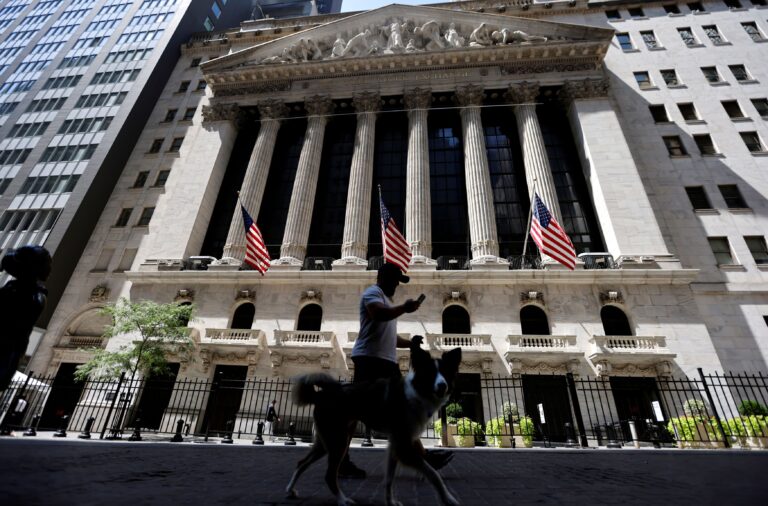A man walks his dog in the shade, out of the midday sun in front of the New York Stock Exchange (NYSE) building in Manhattan, during a hot day in New York City, New York, USA on August 11, 2020.
Mike Seeger | Reuters
In its latest efforts to support the industry, China’s top executive body, the State Council, announced high-level measures late on Wednesday to “promote the high-quality development of venture capital.”
“It all depends on the implementing regulations,” said Marsha Ellis, global co-chair of Morrison & Foerster’s private equity practice.
“It’s good that the central government is acknowledging the problem,” Ellis said. “At least when it comes to tech investment, venture capital can be a positive force for the Chinese market and, frankly, can help China compete with the U.S. in the technology race.”
Regarding what to watch, Ellis said, “What we’re really hoping to see in terms of IPOs is whether approvals start to move at a faster pace.”
“Venture capital investors won’t invest unless there’s a very clear path to an exit,” she said, noting that this hasn’t been the case over the past year or so.
The new policy includes a section on expanding venture capital exit channels, with an emphasis on supporting innovative companies. It also calls for introducing a system for managing overseas listings to facilitate exit channels for non-renminbi-denominated venture capital funds.
“The real bottleneck for overseas listings is overseas IPO procedures and foreign exchange regulations,” said Winston Ma, an adjunct professor at New York University School of Law.
The pace of domestic and international initial public offerings has slowed, with investors, particularly those putting dollar money into China-based venture capital funds, favoring IPOs in the United States, the largest and most liquid market.
Looking ahead, “the market is watching the speed of U.S. IPO approvals,” Ming Liao, founding partner at Prospect Avenue Capital, told CNBC in a Chinese translation.
Chinese authorities have stepped up scrutiny and introduced new rules for overseas IPOs after ride-hailing company Didi Chuxing went ahead with a U.S. listing in 2021 despite reports it was under government investigation. Separately, the U.S. has stepped up scrutiny of U.S. capital flowing into China, particularly for military-related companies.
A lack of regulation has led to a number of fraud cases surrounding Chinese companies’ IPOs in the United States.
Morrison & Foerster’s Ellis warned that the new policy would encourage companies and research institutions to get more involved in venture capital.
“Unfortunately, if companies that are not professional investors start doing this with the encouragement of the government, it may end up doing more damage to the market in the long run because they will lose money and it will be a stain on China’s venture capital market,” Ellis said. “You need professionals for this.”
The China Securities Regulatory Commission has increased penalties for misleading investors and clarified requirements for overseas initial public offerings, issuing updated rules last year that will take effect on March 31, 2023, requiring domestic companies to comply with national security measures and personal information protection laws before listing overseas.
Since then, 73 companies have listed in the United States and 85 in Hong Kong, state media said, Fan Xinhai, vice chairman of the commission, said at a meeting on Wednesday.
In the report, Fan said the speed of IPO processing is not fast enough and will be accelerated, adding that the commission is increasingly supporting mainland Chinese companies to list overseas, particularly in Hong Kong.
Fast fashion giant SHEIN, which has been trying to distance itself from its China-based brands, has reportedly shifted plans for a U.S. listing to London amid regulatory scrutiny.
China has also been working hard to develop its domestic stock market, which is only about 30 years old.
Equity analysts at Morgan Stanley noted separate comments on Wednesday from Wu Qing, chairman of the China Securities Regulatory Commission, that capital markets should step up targeted support for companies in line with the country’s efforts to develop new technology.
“We believe this suggests that capital markets may be welcoming to a more diverse range of IPO candidates as long as they can demonstrate innovation and drive productivity gains. However, with higher standards also being introduced, IPO volume may remain low in the near term,” the Morgan Stanley report said.
Wu took over as head of the CSRC in February after a volatile slide in mainland Chinese stock prices, which have since recouped losses so far this year.
The new policy also calls for supporting international investment institutions in setting up yuan-denominated funds.
“If it’s easier for foreign funds to set up yuan funds, there will be funds that want to do that,” Ellis said.
“A lot of the China-focused funds are headquartered in Asia,” she says. “They’re US dollar-denominated funds, but managers also want to manage domestic yuan-denominated funds in China because they believe they can actually raise money in China to invest in China. Meanwhile, raising US dollars from the US, or in some cases Europe, for a China-focused fund is very difficult right now.”

